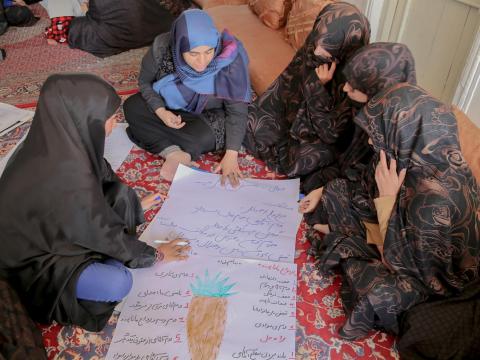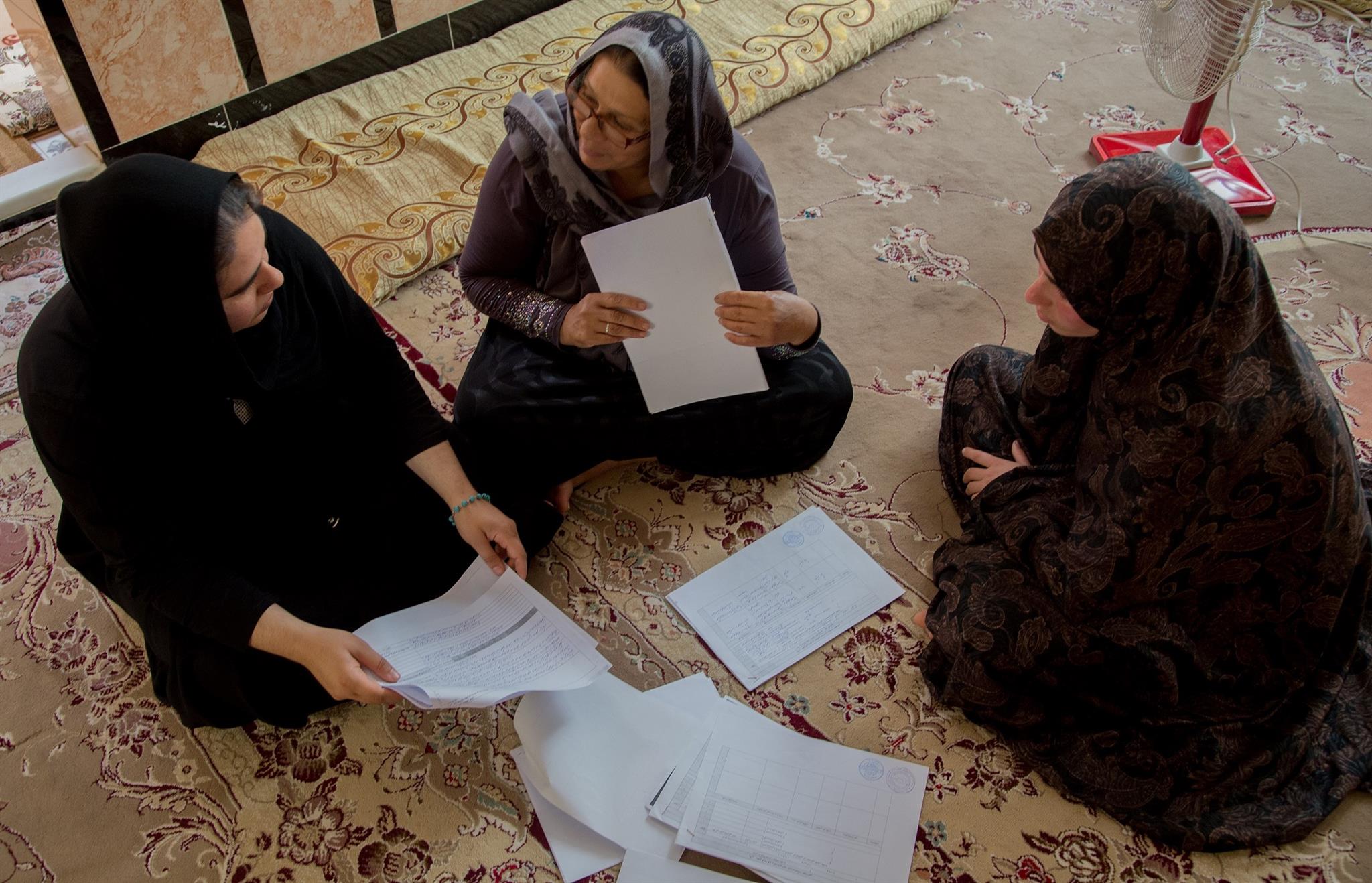Afghan women: leading the country into the future

When Bolghis, 40, Head of her village’s all-woman Shura (women’s council) discovered that 25 girls in her community had dropped out of school, she knew that it was time for her to apply the knowledge she had gained through World Vision (WV) sponsored trainings.
At issue was the harassment of women, especially young students, by a group of anonymous motorcyclists in the streets of a very remote village, which had the effect of limiting women’s mobility and access to public spaces.
Morvarid, 16, remembers one morning in particular when she was on her way to school. “I usually went with my classmate, but that day I was alone. I had an exam. I was lost in thought repeating lessons in my mind. I heard the sound of a motorcycle, but I ignored it. There was no one in the street. I felt that the motorcycle was getting close to me from behind.”
The man grabbed her scarf on his way past and ripped it off. “I was shocked and could hear the sound of my heart beating. When I found myself without a scarf I ducked into a neighbour's house. A woman was…washing clothes in the yard. When she saw me in that state she immediately came to hug me and I just started to cry.” As a direct result of the harassment, Morvarid was forced to withdraw from school for an entire year.
Similar incidents had happened in three villages in Bolghis’s district, which had created a serious challenge for young girls who were being discouraged by their fathers and older brothers from leaving the home or going to school.
‘it is better for you to stay at home and help your mother with chores than be a liability for the family.’
Morvarid says, “My father didn’t allow me to go to school. He told me, ‘it is better for you to stay at home and help your mother with chores than be a liability for the family.’”
Learning of the harassment, WV-trained Shura members brought the issue to Bolghis. “In one of our monthly meetings with Shura members, three of them raised the issue of street harassment and how it impacted women’s social activities and school participation.”
Taking what she had learned from the trainings, Bolghis informed the villages’ elders and Mullahs, and together they went to the district governor to find a solution for the problem.
“The district governor called the nearby police station immediately and requested their support,” she explains. “They sent secret police into the villages to investigate and search for the motorcyclists. After a week, they were able to identify and arrest one of them and he leaked information about the others involved.”
After the successful police operation villagers were informed by local Mullahs about maintaining safety in the community and facilitating the movement of women in the streets.
Three students who missed school for more than three weeks were not able to register for the current schoolyear, but many others participated in school, free from the fear of harassment.
In Bolghis province, all 15 provincial districts have an all-woman Shura body (comprised of a local head and members), which function as decision-making councils. There are no qualifications necessary for members, and their station in the community does not limit their participation in any way.
“We were totally invisible in the community. We only carried the name of women’s Shura, without [the power] to do anything positive.”
When Bolghis was selected as the Head of Shura 15 years ago, neither she nor the other members were fully aware of their responsibilities in the community. “We didn’t know to whom we should report and most of the villagers didn’t know about our existence,” she says. “We were totally invisible in the community. We only carried the name of women’s Shura, without [the power] to do anything positive.”
A World Vision Community Development Worker (on the left), checking the registration of cases by Women’s Shura members, to be reported to relevant government departments (Women’s Shura Head in the middle with a Shura member on the right)
Empowering of woman leaders
World Vision Afghanistan (WVA) empowers women by enhancing their political and civil roles in society. The “Women’s Empowerment” Project is implemented with the financial support of the European Union (EU) and Australian NGO Cooperation Programme, in partnership with the Social Development and Advocacy Organisation (SDAO) and Women Activities and Social Service Association (WASSA). The project promotes women’s rights and gender equality and increases women’s participation in civil society.
Through the project WVA has worked with the Department of Women’s Affairs (DoWA) to create standardised roles and responsibilities for women in Shura bodies in Herat and to enhance their skills and knowledge to represent other women in their districts.
Shura members were trained in seven areas: Gender, Communication, General Management, Advocacy, Project monitoring and Facilitation Skills.
Bolghis notes the impact the project has had on village life. “Before the trainings we didn’t know to whom we should refer if we were unable to solve a problem ourselves…[Occasionally] we were successful in solving a family problem, but most of the time not, [which] led to less trust between villagers. [The Shura] rarely came to women’s minds when they had a problem either in the family or in the village.”
Trainings have also empowered Shuras to meet with women in the community and the provincial and district government departments and have enabled members to create an effective link between women and local government.
Bolghis and other Shura members decided to have monthly meetings with women within the community where they have a chance to raise issues and identify problems.
She says that, “In general, there are three types of cases: referrals, agreements and withdrawals. If we can’t solve a justice case we will either introduce the woman to DoWA or a Human Rights Organisation. Some cases will be solved by negation in which we usually involve Mullahs and village elders. Other cases can be withdrawn by women if the problem was already solved within the family framework.”
Since completing the training, the number of cases referred to the Women’s Shura has increased from 0-1 to 4-5 cases per month, which is evidence of the increased confidence and trust of the community. In a recent case, Bolghis and her team addressed a problem relating to child and forced marriage.
Depending on the nature of the problem, the Shura will hold quarterly meetings with various government departments, the district governor, DoWA and other bodies for whom a particular problem may be relevant.
"And you enabled us to be a patient, steady rock for women whose problems can be heard and solved.”
Bolghis credits the efforts of WVA for giving these women a concrete example of what life could be like with greater equality and involvement. “You opened up a new chapter in our lives,” she says. “You motivated and inspired us. We were asleep and you wakened us. You brought to life our roles and responsibilities. And you enabled us to be a patient, steady rock for women whose problems can be heard and solved.”
All in all, WVA’s Women’s Empowerment Project has reached and trained 240 Shura members in Herat Province, a major step toward preparing women for leadership positions in the future.
